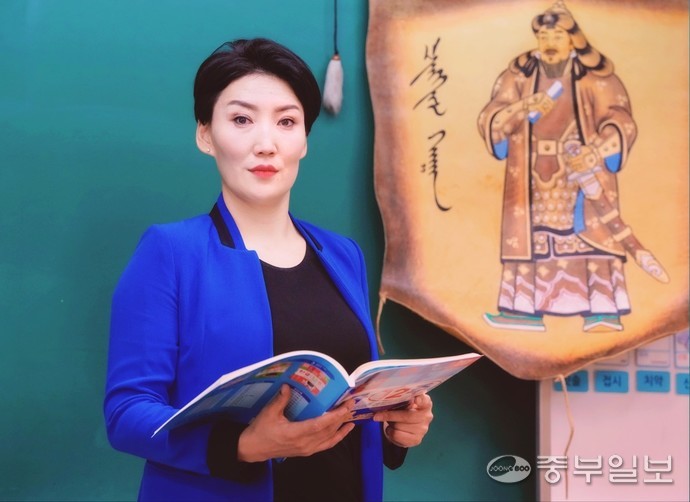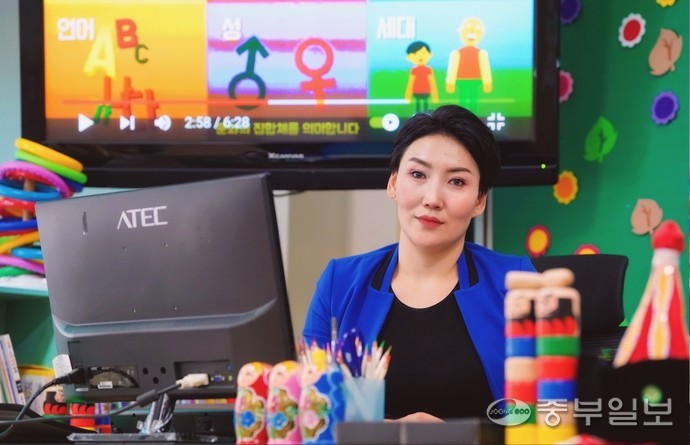The interview with Lee Seul-gi, a multicultural language instructor from Mongolia
This is the era of multiculturalism for 2 million people. If you look around, you can easily see neighbors with different skin colors and languages. However, Korean society's notion of multiculturalism is not keeping up with the changes of the times. To solve this problem, the Joongbooilbo has planned a ‘multi-culture story(다문화 스토리)’ that introduces multicultural neighbors living in various ways. ‘Multi-culture Story(다문화 스토리)’ aims to calmly capture the stories of multicultural people living around us and create changes in Korean society in the age of multiculturalism. -Ed-.
“I found love in Korea which I visit for a trip. The Korean friend who guided me on the journey became my spouse. Being with the one I love is more important than anything else. I gave up a stable job as a civil servant and decided to stay in Korea.”
Lee Seul-gi from Mongolia first visited Korea in 2004. She has been living in Korea for 18 years. Now, she feels like Korea is a more comfortable place than anywhere else. She appreciates every moment spent in Korea, She said that she has received a lot of help from people around her because she is a foreigner, rather than being discriminated against because she is a foreigner, Every time when she has got support from people, she always thought that I want to be a person who helps people who are in the same situation as me someday. She is currently engaged in various social activities for immigrants. She is happy that she can be a person who helps someone people rather than being helped. Joongbooilbo met her at an elementary school in Goyang City where she works as a multicultural language instructor.

-Why did you come to Korea?
When I was in college in Mongolia, most of my close friends majored in the Department of Construction. After graduation, my friends who got a job at a construction company often came and went to Korea for work, and each time they told me a lot about Korea. I was curious about Korea. I planned to go to Korea and went on a trip in 2004. At that time, something important most of my life happened. I found love in Korea. The Korean who guided me then is now my husband. He confessed to me during the trip. I like it. (Laughs) Actually, I thought he was cool from the first time I saw him. It goes through the heart.
- You must have had a job in Mongolia.
I was a civil servant in Mongolia. But the more important thing is love than work. So I quit the job.
- It seems that traveling and living are different.
I felt like I was born again. The language and culture were totally different. I had no idea about Korean politics or the social system. There is nothing I could do alone. I tried to learn the Korean language and Korean culture.
- Isn’t it challenging to live as a foreigner in Korea?
There is nothing difficult. On the contrary, since people know that I came from a foreign country, they help me a lot. Some foreigners say they were discriminated against, but that is not a problem in society. No matter where they go in the world, good people and bad people co-exist.
I guess people have been kind to me more because I am from Mongolia. Korean people call the black spot on a baby's buttocks the ‘Mongolian spot’. Due to that, many Koreans seem to feel a sense of kinship with the Mongolians.
-You are working as a multicultural language instructor. What kind of work do you do?
Multicultural language instructors teach the Korean language and culture to children from multicultural families who are not good at Korean and teenagers who have immigrated to Korea. We need to become guardians of children and try to understand children's thoughts and give them psychological stability. No matter how good a student is in their home country, they look like a fool because they are unfamiliar culture and lack Korean language skills when they first come to Kore. The more mistakes are frequent, the more child feels withdrawn. Multicultural language instructors help them to restore self-esteem by building emotional bonds rather than teaching Korean.
- I think a lot of children like you. Are there any memorable memories?
There was a time when I had to quit the school where I worked. At that time, many students came to me and expressed a sense of frustration. One of the students changed her last name to mine and said she wanted to be my child. I had mixed feelings. Along with the thought that I am someone the children can rely on, I am also worried about how lonely they are.

-Why did you decide to become an educator?
Firstly, I am a mother of two children. However, I did not know anything about how to raise children in Korea or what the role of parents was. As a mother, I wanted to know how to educate my children.
Secondly, many Mongolians live in Gunpo, where I have lived since I came to Korea. Among them, I was the best at speaking the Korean language. I decided to become an educator because I wanted to teach my compatriots.
- You seem to be very interested in social movements. I know that you also served as the president of the Mongolian Women's Federation in Korea.
I always thought I wanted to be a helpful person. In the meantime, I was elected as the president of the Mongolian Women's Federation in Korea and worked for four years. Since I have working experience as a journalist and civil servant in Mongolia, I knew how important it is to understand the social system. I thought that if I could quickly grasp information about the Korean system and share it, Mongolians in Korea would be able to settle down more quickly.
- I wonder what the federation is doing
Not only Mongolians but also foreigners who are new to Korea cannot speak Korean fluently It takes a lot of time for them to settle in Korea. In particular, it is a waste of time for adults to spend four to five years adjusting to life in Korea. I try to convey information about Korea in as easy and diverse a way as possible so that they can complete their goals or study as quickly as possible.
In addition, there are many Mongolians who feel lonely. It's hard to make friends because they can't speak Korean well and the culture is different. We held events such as traditional Mongolian dance and song clubs where they can spend time with friends.
We also play a role as a kind of agent to bond Mongolian politicians and business leaders and those of Korea. When the Mongolian National Assembly Speaker recently visited Korea, they asked for our help.
- The number of immigrants is increasing every year. Cou you give them some advice about living in Korea?
I hope they don't think of going to Korea as going to a foreign country. As a global citizen, I hope they consider this as an opportunity to interact with various friends. At the same time, I wish they have a positive and proactive mindset of what can I do and what role I will play. Korean society puts people from countries with low economic power within the framework of so-called 'multiculturalism' and classifies them as socially underprivileged. In fact, it helps a lot too. However, foreigners would be able to adapt faster if they had the thought that I would live while helping someone instead of being helped by someone
-It has been almost 20 years since you came to Korea. How do you feel about that?
Coming to Korea was such a good decision for me. Many Mongolians probably think that I am a successful person. There are more things to help than to receive help from someone. I am so happy just to be a person who can help people and satisfied with my social position.
By Seyong Lee
